XPENG is starting mass production of flying cars by the third quarter of 2025. They plan to make 10,000 units a year. This big step in car tech will change how we travel in India and worldwide. Get ready to see amazing new car features and smart solutions.
Car tech is changing fast, with electric cars, self-driving, and green tech leading the way. These changes are making cars better and more eco-friendly. As we look at 2024’s car tech, we see new limits being pushed.
Electric cars are getting better batteries and AI systems. Self-driving cars are getting closer to being fully autonomous. AI-powered safety features will make driving safer and more comfortable.
Key Takeaways
- Flying cars are set to enter mass production by 2025, with XPENG leading the charge
- Electric vehicles are witnessing significant advancements in battery technology and AI integration
- Autonomous driving is progressing towards Level 4 and Level 5 autonomy, transforming the future of transportation
- Connectivity solutions, including 5G integration and smart infotainment systems, are enriching the in-car experience
- Eco-friendly innovations, such as sustainable materials and carbon-neutral initiatives, are driving the industry towards a greener future
Introduction to Car Tech in 2024
The year 2024 is a big step forward for car technology. The auto industry is always looking to improve safety, efficiency, and how we use our cars. Let’s explore the latest tech that’s changing how we travel.
Overview of Innovations
Car tech is getting a lot of attention, from electric cars to self-driving vehicles. Here are some key advancements:
- Next-gen battery technologies for better EV range and performance
- Level 4 and Level 5 autonomy, bringing us closer to fully self-driving cars
- Advanced driver assistance systems (ADAS) for improved safety and convenience
- Integration of 5G connectivity for seamless in-car experiences
- Eco-friendly materials and manufacturing processes for sustainable transportation
Importance of Technology in Automobiles
Technology in cars is very important. Here are some facts:
| Aspect | Impact |
|---|---|
| Safety | ADAS features have the ability to cut crashes by up to 40% |
| Efficiency | Connected car features can optimize routes, saving time and fuel |
| User Experience | Smart infotainment systems enhance in-car entertainment and productivity |
| Environmental Impact | EVs and sustainable manufacturing practices contribute to a greener future |
As car tech trends evolve, it’s clear that tech will be key in changing how we drive. From making cars safer to helping the environment, tech’s role in cars is huge.
Electric Vehicles (EVs) Advancements
The world of electric vehicles (EVs) is changing fast. New breakthroughs are pushing the industry forward. EVs are getting popular as people want to cut down on carbon emissions. Let’s explore the exciting changes in electric cars.
Next-Gen Battery Technologies
Batteries are key in electric cars, and new tech is amazing. Scientists and makers are working on better batteries. Solid-state batteries could change everything with more power and safety.
Enhanced Charging Infrastructure
More electric cars mean we need better charging spots. Governments and companies are building more charging stations. Now, fast chargers can fill up your car in no time, making long trips easier.
Integration of AI in EV Systems
Artificial intelligence (AI) is changing electric cars in big ways. AI helps manage energy, predicts when you might need repairs, and makes cars more efficient. It also makes driving safer with features like adaptive cruise control.
These changes in batteries, charging, and AI are making electric cars better. As tech gets better and more people can afford it, electric cars will be key in making our transportation greener. The future of cars is electric, and it’s looking bright.
Autonomous Driving Features
The car industry is changing fast, moving towards self-driving cars. In 2024, we’ll see big steps forward in fully autonomous vehicles. They will use advanced AI and safety systems.
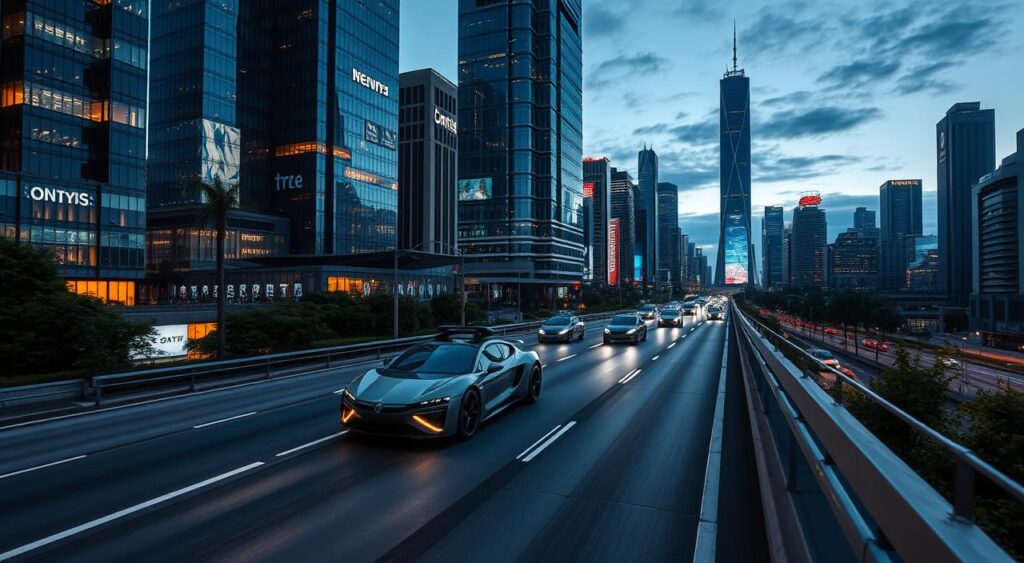
Level 4 and Level 5 Autonomy
Autonomous cars now reach Level 4 and Level 5 autonomy. This means they can drive on their own in most situations. Renesas Electronics Corporation has made new chips for cars. These chips are fast and powerful, making self-driving cars better.
Safety Enhancements through AI
AI is making self-driving cars safer. The R-Car X5H SoC from Renesas has 32 CPU cores for fast processing. It also has six CPU cores for safety, without needing extra chips. This makes cars safer and uses less power.
The market for car chips is growing fast, with a 17% CAGR from 2028 to 2031. This growth is because of the need for more safety in self-driving cars.
Regulatory Challenges Faced
Even with new tech, rules for self-driving cars are a big challenge. Governments are making laws to ensure these cars are safe on roads.
| Company | Investment | Purpose |
|---|---|---|
| Volkswagen Group | Up to $5.8 billion | Joint venture with Rivian Automotive |
| Rivian Automotive | $1 billion convertible note | Initial investment from Volkswagen Group |
Big car companies are working together to make self-driving cars. Volkswagen and Rivian are teaming up. They plan to bring self-driving cars to the market by 2027.
In-Car Connectivity Solutions
In-car connectivity is now a key focus in modern cars. Advanced technologies have made our vehicles smart, connected hubs. I’ll explore the latest solutions changing how we interact with our cars.
5G Integration for Seamlessness
5G technology has changed the game for 5G connected cars. It offers fast data transfer and low latency. This means no more buffering when downloading maps or streaming videos.
The Car Connectivity Consortium (CCC) has led this change. They’ve certified the first two digital key products as CCC Digital Key™ Certified. This milestone shows their commitment to seamless connectivity.
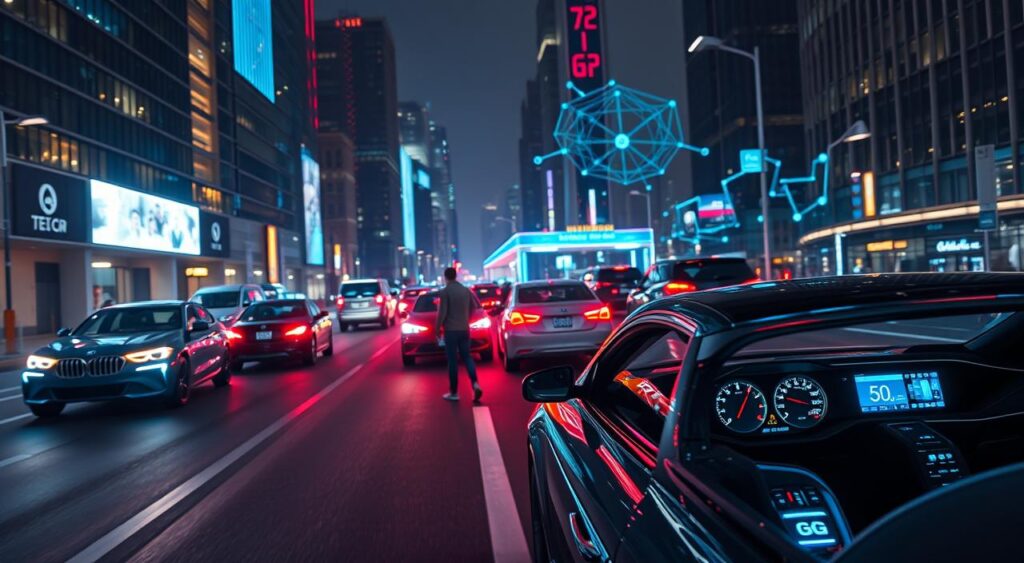
Smart Infotainment Systems
Intelligent infotainment platforms are now standard in cars. These systems provide personalized content and services. They’re easy to use, thanks to voice commands and gesture controls.
The CCC’s Digital Key™ Certification Program is growing. It will include Bluetooth Low Energy (BLE) and ultra-wideband (UWB) technologies. This will make these systems even more advanced.
Vehicle-to-Everything (V2X) Communication
V2X technology lets cars talk to their surroundings. This includes other cars, infrastructure, and pedestrians. It makes driving safer and more efficient.
Imagine your car warning you of hazards or finding the best route. It can even work with traffic lights for a smoother ride. The CCC is working to make digital keys universal. They’re promoting standards at industry events to encourage adoption.
| Technology | Benefits |
|---|---|
| 5G | Seamless connectivity, high-speed data transfer |
| Smart Infotainment | Personalized content, intuitive interaction |
| V2X | Enhanced safety, improved efficiency |
The future of seamless in-vehicle connectivity looks bright. 5G, smart infotainment, and V2X will make driving safer and more enjoyable. As the automotive industry evolves, I’m excited to see these technologies’ impact on our daily drives.
Advanced Driver Assistance Systems (ADAS)
In 2024, Advanced Driver Assistance Systems (ADAS) have made big strides. They offer better safety and convenience for drivers. These systems use AI, sensors, and advanced processing to make driving safer and more fun.
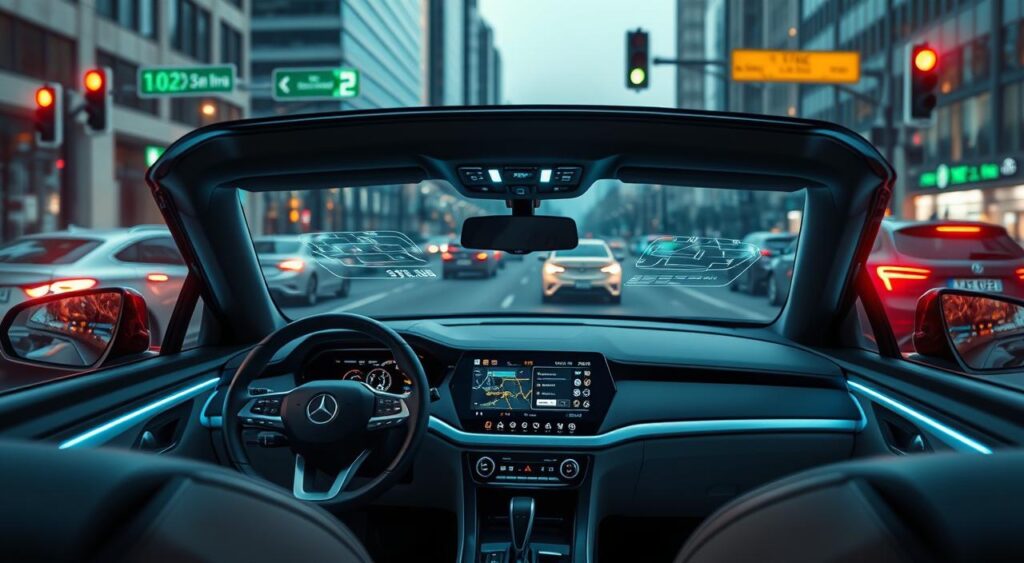
The R-Car X5H SoC by Renesas Electronics Corporation is a key advancement in ADAS. It’s built with 3-nanometer technology, providing top-notch integration and performance. This chip supports AI acceleration of up to 400 TOPS and GPU processing of up to 4 TFLOPS. It also has 32 Arm Cortex-A720AE CPU cores for app processing and six Arm Cortex-R52 CPU cores for real-time tasks.
Latest Features of ADAS in 2024
The latest ADAS features in 2024 include:
- Advanced collision avoidance systems that can detect and respond to threats in real-time
- Improved parking assist technologies, making parallel and perpendicular parking easy
- Enhanced adaptive cruise control that adjusts speed based on traffic and road conditions
- Lane keeping assist systems that keep the vehicle in its lane
These features are thanks to advancements in automotive semiconductors, like the R-Car X5H SoC. It boosts AI and graphics processing with chiplet technology. The SoC series supports AI acceleration of up to 400 TOPS and GPU processing of up to 4 TFLOPS. It also cuts power consumption by 30-35% compared to 5-nm process nodes.
Benefits for Safety and Convenience
ADAS technology brings two main benefits: enhanced safety and increased convenience. It reduces the risk of accidents by detecting and responding to hazards better than a human driver. Features like parking assist and adaptive cruise control also make driving less stressful and more enjoyable.
| ADAS Feature | Safety Benefit | Convenience Benefit |
|---|---|---|
| Collision Avoidance Systems | Reduces the risk of accidents | Provides peace of mind while driving |
| Parking Assist | Prevents collisions while parking | Makes parking effortless and stress-free |
| Adaptive Cruise Control | Maintains a safe distance from other vehicles | Reduces driver fatigue on long trips |
| Lane Keeping Assist | Prevents unintentional lane departures | Allows for a more relaxed driving experience |
As the automotive industry keeps evolving, ADAS technology will become even more important. With advancements in AI, sensors, and processing, we can expect even more sophisticated driver assistance features. This will make our roads safer and our journeys more enjoyable.
Eco-Friendly Innovations in Cars
The car industry is moving towards green technology. It’s using eco-friendly innovations to be more sustainable and reduce harm to the environment. This includes the materials used and the air inside cars.
Sustainable Materials Used in Manufacturing
Car makers are using sustainable materials in their cars. They’re using recycled plastics and bio-based composites instead of traditional materials. This cuts down the carbon footprint of making cars.
Companies like Hyundai Motor America are leading the way. They contribute $20.1 billion to the U.S. economy and support 190,000 jobs. This is through their operations and 835 independent dealers.
Innovations in Air Quality Management
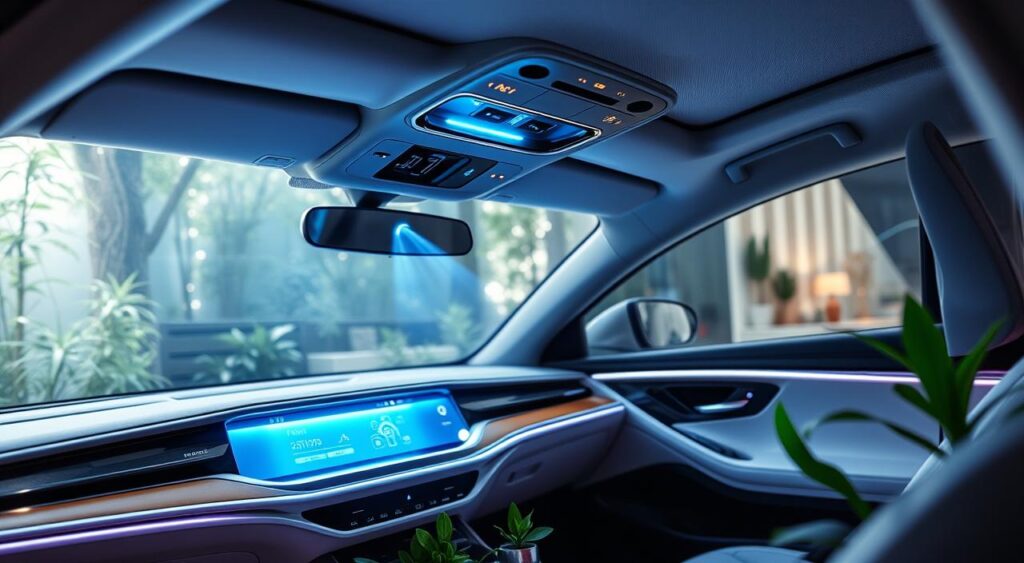
Car makers are focusing on clean air inside cars. They’re using advanced filtration systems to remove pollutants. This makes driving more pleasant.
The Hyundai IONIQ 9 is a great example. It’s an all-electric SUV that’s expected to be a hit in 2025. It has a unique design that maximizes space and efficiency.
Carbon Neutral Initiatives by Manufacturers
Car makers are also going carbon neutral. They’re using renewable energy and optimizing production. They’re investing in projects that offset carbon emissions.
This shows their commitment to sustainability. The rise of electric vehicles like the Tesla Model 3 is a big step. It can offset its pollution in just 15,000 miles.
| Car Model | Eco-Friendly Feature | Benefit |
|---|---|---|
| Hyundai IONIQ 9 | Advanced filtration system | Clean and healthy in-vehicle air |
| Tesla Model 3 | Electric powertrain | Reduced carbon emissions |
| Rivian Electric Vehicles | Remote preconditioning via app | Enhanced convenience and efficiency |
Eco-friendly innovations are key to the future of cars. They’re making cars more sustainable and clean. This includes using sustainable materials, improving air quality, and going carbon neutral.
Trends in Smart Mobility
The way we travel in cities is changing fast, thanks to smart mobility solutions. These new technologies make travel easier, more efficient, and better for the planet. Let’s dive into the latest smart mobility trends and how they’re shaping our future.
Car-Sharing and Ridesharing Technologies
Car-sharing platforms and ride-hailing apps are becoming very popular. They offer flexible and affordable travel options instead of owning a car. These services help reduce traffic and pollution by using cars more efficiently.
Impact of Mobility as a Service (MaaS)
Mobility as a Service (MaaS) combines different transport options into one easy platform. MaaS apps let you plan and book your journey all in one place. It makes traveling easier and more flexible, helping you choose the best way to get where you need to go.
| Smart Mobility Trend | Key Benefits |
|---|---|
| Car-Sharing Platforms | Reduced car ownership costs, increased vehicle utilization |
| Ride-Hailing Apps | On-demand transportation, reduced wait times |
| Mobility as a Service (MaaS) | Seamless integration of multiple transportation modes, enhanced convenience |
Trends Shaping the Future of Transportation
Looking ahead, many future transportation trends will change how we travel. Self-driving cars, for example, will make roads safer and reduce accidents. Smart traffic systems and electric vehicles will also make travel cleaner and more efficient.
These smart mobility trends are set to transform cities in India and worldwide. By embracing new technologies, we can make travel better for everyone. It’s time for us all to adapt and take advantage of these exciting changes.
Conclusion: The Future of Driving
The car industry is changing fast. Electric cars, self-driving tech, and green innovations are leading the way. These changes will make our roads safer, trips smoother, and our planet greener.
Summary of Key Innovations
The market for car voice systems is growing fast. It’s set to hit USD 8.59 billion by 2031, with a 15.2% annual growth. This is thanks to tech like speech recognition and voice biometrics in cars. Also, the armored vehicle market is expected to reach USD 32.26 billion by 2030, driven by security needs and defense spending.
My Perspective on the Evolution of Car Tech
I’m thrilled about the future of car tech. AI, 5G, and other innovations will make cars smarter and more connected. But we must be careful to keep safety and security first. Together, we can make driving better for everyone.

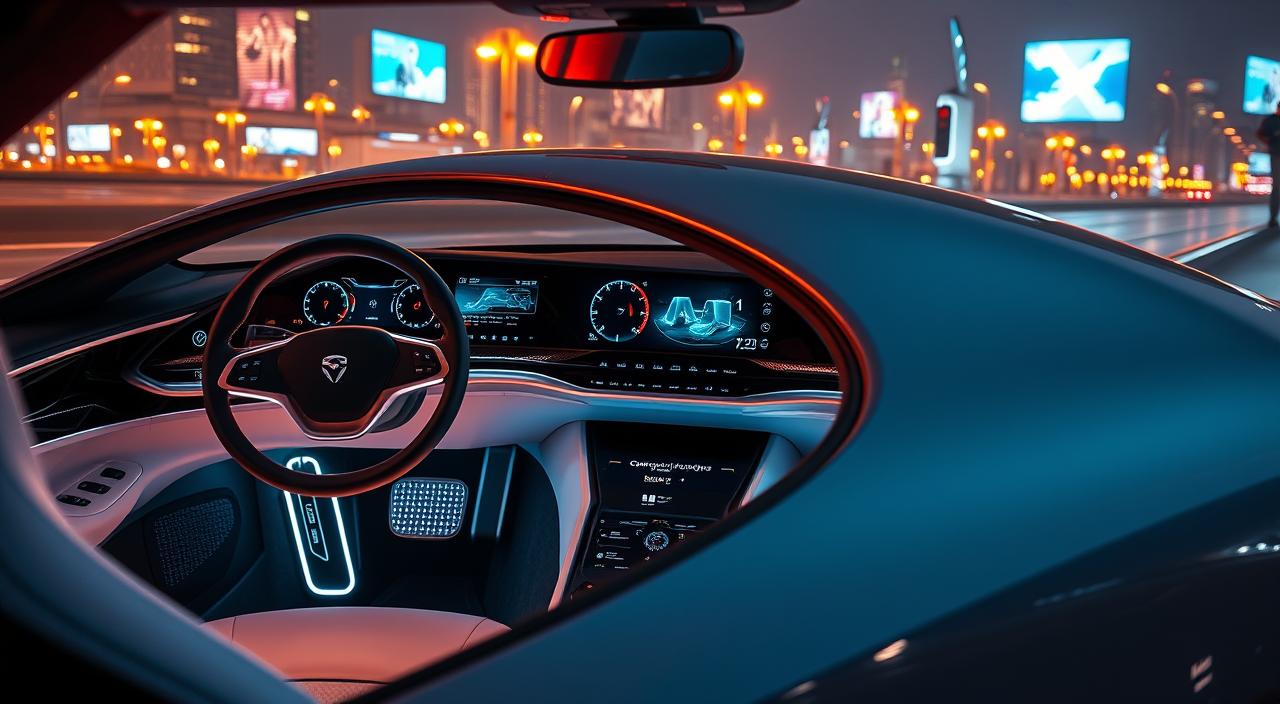


Leave a Reply